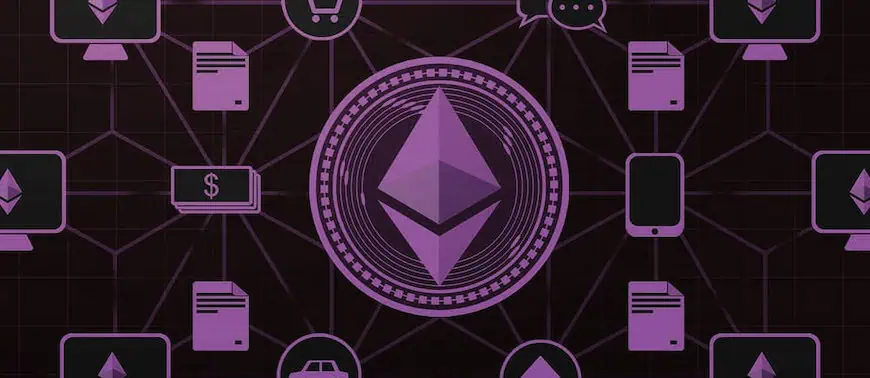Blockchain technology, though developed 14 years ago is still a relatively new technology being explored. This exploration has resulted in the innovation of dApps, which are taking over the blockchain space. If you’re curious about what dApps are and their significance, you’re in the right spot. This guide aims to cover all aspects of dApps, providing you with insights into their functionality and purpose.

What are dApps?
dApps or decentralized applications are programs built on blockchain technology that utilize a peer-to-peer system. They are similar to normal or traditional applications but are decentralized, meaning they are not controlled by a single authority, and every request is filtered through every person on the chain. dApps can be based on a website or designed as a mobile application.
Functionally, dApps differ from normal apps in other ways.
- They are typically open-source. This means the original source code is freely available to those and the network and they can modify it. Once a developer releases the code, others can take it and build on top of it.
- Most dApps make use of tokens as a rewarding mechanism for their creators or users and as an exchange of value where needed.
- dApp creators own their own data and they can choose to do what they will with it.
How do dApps work?
The Ethereum blockchain has popularized dApps as most of them are built on it. dApps are supported by a smart contract, which acts as a mediator of all transactions and an enforcer of the network rules.
Though an integral part of the dApp, a smart contract exists on the back end. Instead of being stored on a server in a central place, the smart contract runs on a ledger of data that is stored in blocks. Every data block is interconnected and regulated through cryptographic validation.
dApp use cases
Thousands of dApps are already in use. While dApps have mostly gained traction in gaming, they have several use cases and can be applied in almost every industry. Some of the use cases include:
- Identity verification. dApps help to store and verify identities and can be used in voter registration.
- Financial services. dApps have been used to facilitate various financial transactions, especially cross-border transactions.
- Social networks. Social networking dApps like Minds give users control over their data.
- Charity. dApps can be used as a great way for donors to send money to their charities of choice. TraceDonate is such a service. It connects charities and donors to beneficiaries ensuring the donations reach those in need.
Why we need dApps
Utilizing dApps offers numerous advantages.
Security
As the need for data privacy increases, most if not all organizations are looking for ways to secure data. dApps make securing the data more manageable, mainly because dApps are not vulnerable to a single point of failure. Furthermore, the use of cryptographic verification methods like Zero Knowledge Proof (ZKP) make dApps double-safe.
Transparency
dApps being open-source allows the code to be visible to all users on the network, enabling transparency and ensuring fairness as everyone can observe all the transactions taking place. This verification process also serves as an excellent means to prevent scams or malware within the network.
No downtime
dApps have proven to be more reliable than centralized applications because they span multiple nodes and thus each node will have to simultaneously fail if anything should anything happen. Simply put, it is harder for a dApp to go completely offline or die.
Decentralization
dApps function independently, devoid of a central authority, rather using a consensus mechanism for transaction validation. This absence of a central authority proves advantageous in societies lacking full democratization or where control over the internet is still maintained.
DeFi
dApps have facilitated access to decentralized finance, also known as DeFi, establishing a financial ecosystem free from control by any third-party entity. DeFi operates under trusted networks distributed all over the world, meaning anyone can access different financial services or products from anywhere.
dApp Drawbacks
As fantastic as dApps are, they still pose some challenges, the most important being a lack of scalability. Depending on the blockchain the app is built on, it can prove difficult for the app to grow particularly if the blockchain has limited transaction processing capabilities making it slow and expensive.
Moreover, dApps initial costs can be really expensive because everything has to run on each node. Newer apps are trying to deal with these high computational costs by using designs like proof of stake.
As much as it can be difficult to hack a dApp, it can be difficult to track scams due to the decentralized nature of the apps. This means that it is up to the users to avoid these dApp scams, which can come through malware and phishing schemes.
Bottom line
dApps still have a long way to go but in order for their usage to become mainstream, the challenges above have to be addressed. Once these challenges are addressed, dApps will likely dominate in the future.
Disclaimer: Investing can be quite a wild ride – especially when you don’t know the terrain! To keep things from getting too rocky, take some time beforehand to get familiar with all of the risks involved. Our site is here to up your investor game by providing all available intel about platforms and trends, but we don’t take responsibility nor can we be held accountable as advisors. That being said, it’s still important for you to make educated decisions that match what works best for YOU – just remember: no amount of savvy will guarantee success or protect against loss so invest money you can spare.











